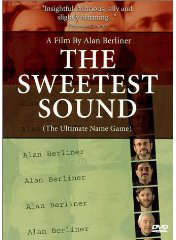 Alan Berliner is a name that keeps popping up in books about documentary film that I’m reading. So I finally decided to investigate the Berliner buzz by ordering a copy of The Sweetest Sound. Turns out there’s a lot to this name. Enough, in fact, to make a 60 minute documentary film. But what this film proves to me is that if you can make a film on this subject, you can make a film about anything. Whether it’s a film worth watching is less clear.
Alan Berliner is a name that keeps popping up in books about documentary film that I’m reading. So I finally decided to investigate the Berliner buzz by ordering a copy of The Sweetest Sound. Turns out there’s a lot to this name. Enough, in fact, to make a 60 minute documentary film. But what this film proves to me is that if you can make a film on this subject, you can make a film about anything. Whether it’s a film worth watching is less clear.
Synopsis: New York filmmaker Alan Berliner launches a personal investigation into the origins of his name with the help of his parents, people on the street, and 12 other Alan Berliners.
Story Structure: Structured as a personal essay, the film attempts to launch a story train with this line from the filmmaker: “when it comes to names, there’s no such thing as community property.” In essence, Berliner lays claim to the name and calls into question the right of other Alan Berliners to “his” name. He sets up a meeting with 12 other of them by flying them to New York and putting them up in hotel. However, there’s no specific challenge, or other “must see” reason to see what happens when the 12 of them meet. In fact, very little happens when they meet. They basically stand around talking as if they were at a Chamber of Commerce event. While it may be a flimsy story train, it is a train nevertheless, and Berliner then uses interviews with people ranging from his parents to people in the street, to explore what Alan Berliner is all about. Maybe if my name was Alan Berliner, I would care. But it’s not.
This film strikes me as being made for TV, rather than as a film, at exactly 60 minutes in length. I think it would have made a much better 30-minute TV show, than a 60-minute one. That would have allowed for him to edit out the duplicated devices that were interesting once, but not after the 3rd or 4th time.
This film reminded me a lot of Ross McElwee, reflexive filmmaking. But it isn’t nearly as interesting as Sherman’s March. It’s problem, perhaps, lies less in its approach and more in its subject: which topic do YOU think is more inherently interesting: someone’s investigation of their name, or someone trying to find a girlfriend?
Cinematography: There’s one scene in this film that I’ve never seen done before, and I think works extremely well. It’s the last one in the film. The 13 Alan Berliners are all gathered around a round table, and they are having a toast. He put the camera on a lazy susan, and spun it very carefully to follow the glass clinking as it travels all the way around the room, until it ends up on the filmmaker, at which it suddenly stops. This rocked. He used the same technique earlier in the film, as a device to whip-pan through all the guests, to stop on a specific one at the point where that person begins talking.
There are lengthy narrated sequences in which we see circa 1999 websites being clicked and searched on. Perhaps this is interesting for one reason – it shows how badly the web sucked in the years prior to Google. But it’s a tiresome device.
I liked the way he filmed the his nieces, who were swinging. He put camera in front of them on sticks, locked off, with enough depth to keep everything in focus. Works.
Simple animation of name being written works, but it’s predictable after first use, and like many of the other elements in the film, he returns to it again and again. In fact, if there’s one take-home lesson for me from this film, it’s this: Use cool effects sparingly.
Editing: It felt like a 30 minute film edited to be 60 minutes. One innovative thing: He continues narration throughout credit roll. Haven’t heard that one before.
Music and Sound: I don’t recall any music in this film. But what I DO recall, in fact what I wish I could forget, is the never-ending mouse clicking and computer keyboard pressing that this filmmaker made use of. That device was cute for about 30 seconds, but it never ends. Another nice effect: sewing machine sound effect with tombs scrolling past rapid-fire.
While this isn’t one of my favorite films, I give Berliner major props for putting himself squarely in the middle of his films. That’s always a bold move: some people (me) aren’t going to like it. But for those with im the story resonates, it can resonate big time, and Berliner has had great success in getting his films screened at major film festivals and is widely perceived to be an “artist” filmmaker, with his work being recognized with a retrospectives of his films presented at the Museum of Modern Art (NYC). But for me, I’d take a movie theater over a museum as a showcase for my work any day.